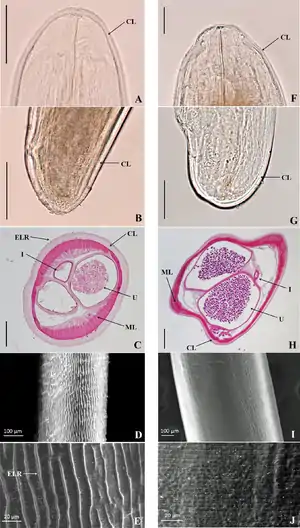Dirofilariasis
Dirofilariasis is an infection by parasites of the genus Dirofilaria.[1] It is transmitted through a mosquito bite; its main hosts include dogs and wild canids. These can give rise to granulomas in the pulmonary artery. Some common symptoms include cough, fever and pleural effusion. It may also appear on X-rays of the chest.[2]
| Dirofilariasis | |
|---|---|
 | |
| Comparison of probable Dirofilaria repens (left) and Dirofilaria immitis (right) | |
| Specialty | Infectious diseases |
Causes
It can be caused by:
- Dirofilaria immitis
- Dirofilaria repens
- Dirofilaria tenuis
Diagnosis
Dirofilariasis is often diagnosed by the examination of tissue obtained as part of the diagnostic investigation of coin lesions. Blood tests are not yet helpful in the diagnosis of dirofilariasis in humans.[3]
Treatment
Treatment with tetracycline antibiotics has been reported to damage Dirofilaria immitis, often causing death of adult worms.[4]
References
- "Dirofilariasis: Practice Essentials, Background, Pathophysiology". 2017-02-09.
{{cite journal}}: Cite journal requires|journal=(help) - "Dirofilariasis FAQs". Center for disease control and prevention. February 8, 2012. Retrieved May 16, 2019.
- Prevention, CDC - Centers for Disease Control and. "CDC - Dirofliariasis - Frequently Asked Questions (FAQs)". www.cdc.gov. Retrieved 2017-10-08.
- Kramer, L.; Grandi, G.; Leoni, M.; Passeri, B.; McCall, J.; Genchi, C.; Mortarino, M.; Bazzocchi, C. (2008-12-10). "Wolbachia and its influence on the pathology and immunology of Dirofilaria immitis infection". Veterinary Parasitology. 158 (3): 191–195. doi:10.1016/j.vetpar.2008.09.014. ISSN 0304-4017. PMID 18947926.
External links
This article is issued from Wikipedia. The text is licensed under Creative Commons - Attribution - Sharealike. Additional terms may apply for the media files.